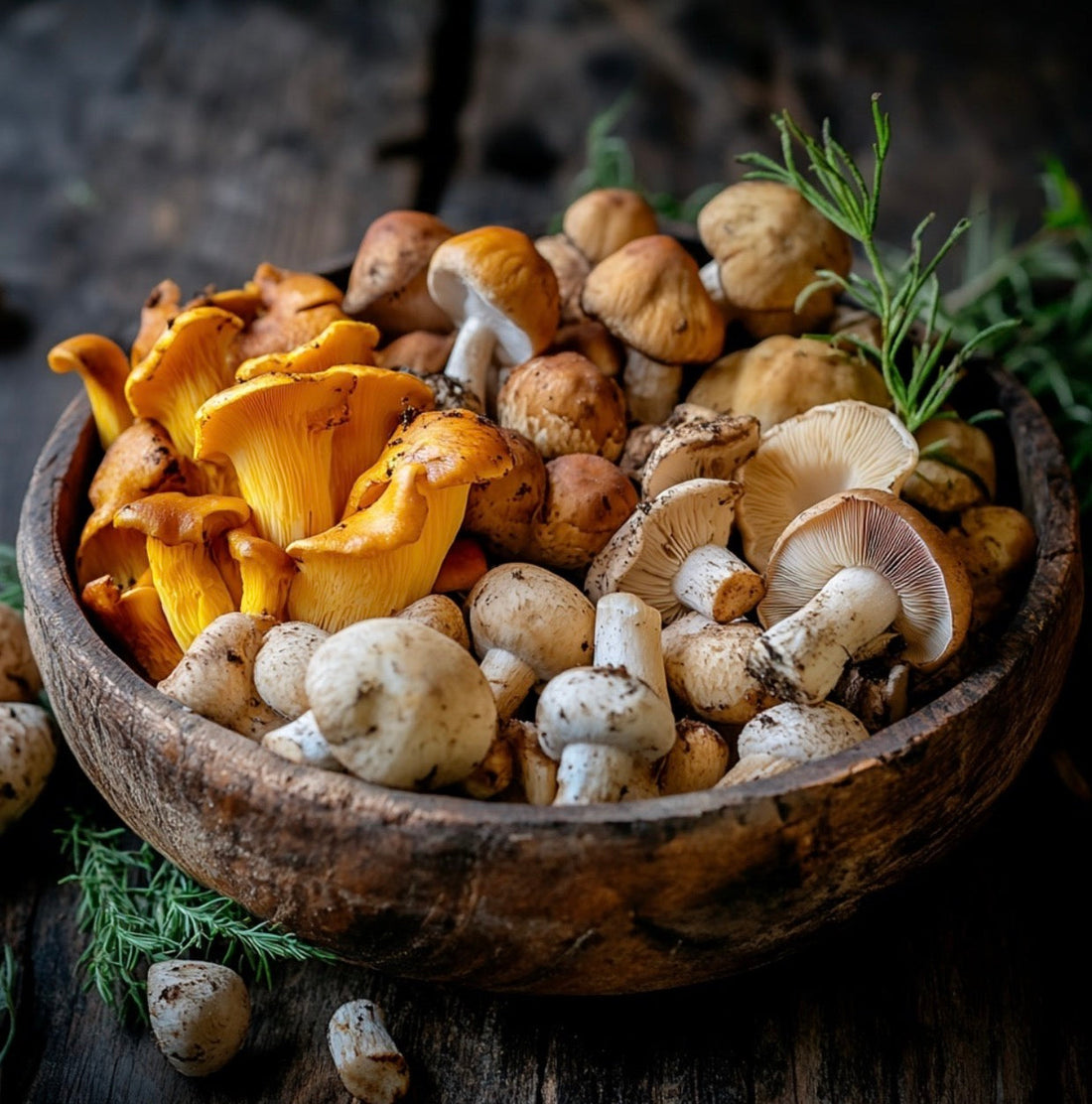
The Healing Power of Ergothioneine: Nature's Longevity Vitamin Hidden in Your Kitchen
08/01/25Share
Key Takeaway: Ergothioneine in mushrooms acts as a "longevity vitamin" that crosses the blood-brain barrier to protect against aging and cognitive decline naturally.
What if the secret to healthy aging was hiding in plain sight on your dinner plate? Recent groundbreaking research has revealed that a rare antioxidant called ergothioneine, found abundantly in common mushrooms, may be one of nature's most powerful weapons against aging and disease.
Scientists are now calling ergothioneine a "longevity vitamin"—a compound so essential for healthy aging that some researchers believe it should be classified alongside traditional vitamins. Unlike expensive anti-aging supplements, this remarkable nutrient is readily available in mushrooms you can find at any grocery store.
The most fascinating discovery? Your body has evolved a special protein transporter specifically designed to capture and concentrate ergothioneine in areas where it's needed most—your brain, heart, and other vital organs under oxidative stress.
What is Ergothioneine? The Antioxidant That Science Almost Missed
Ergothioneine is a sulfur-containing amino acid first discovered in 1909 by French chemist Charles Tanret in ergot fungus. For over a century, scientists largely overlooked this compound, dismissing it as just another antioxidant among many.
However, ergothioneine is far from ordinary. What makes it unique among antioxidants is its remarkable stability and bioavailability. While other antioxidants like vitamin C and glutathione break down quickly in the body, ergothioneine exists in a special thiol-thione form that remains stable and active for extended periods.
This dedicated transport system allows ergothioneine to:
- Cross the blood-brain barrier to protect neurons directly
- Accumulate in mitochondria where cellular energy is produced
- Concentrate in tissues experiencing high oxidative stress
- Remain active for weeks rather than hours like other antioxidants
Why Scientists Are Calling Ergothioneine Essential for Healthy Aging
The evidence supporting ergothioneine as a longevity vitamin continues to mount with each new study. Unlike traditional vitamins that prevent specific deficiency diseases, ergothioneine appears to protect against the fundamental processes of aging itself.
Groundbreaking Research Findings
The mechanisms behind these protective effects are becoming clearer as research progresses:
Mitochondrial Protection: Ergothioneine specifically targets mitochondria—the powerhouses of cells—where it prevents the oxidative damage that accumulates with age. This protection helps maintain cellular energy production and prevents the decline associated with aging.

Inflammation Regulation: Unlike simple antioxidants that only neutralize free radicals, ergothioneine actively modulates inflammatory pathways. It appears to activate Nrf2, a master regulator of cellular antioxidant defenses, providing comprehensive protection against chronic inflammation.
DNA Damage Prevention: Studies show ergothioneine protects DNA from oxidative damage and helps repair mechanisms function more effectively, potentially slowing cellular aging at the genetic level.
Nature's Richest Sources: Which Mushrooms Pack the Most Punch
While ergothioneine can be found in small amounts throughout the food chain, mushrooms are by far the richest dietary source—containing up to 40 times more ergothioneine than any other food.
| Mushroom Variety | Ergothioneine Content (mg/100g dry weight) | Availability |
|---|---|---|
| Shiitake (Lentinula edodes) | 55-90 | Widely available fresh/dried |
| King Oyster (Pleurotus eryngii) | 45-75 | Most grocery stores |
| Oyster Mushrooms | 35-65 | Common, affordable |
| White Button (Agaricus bisporus) | 15-25 | Most common variety |
| Porcini (Boletus edulis) | 40-60 | Specialty stores, dried |
Practical Tip: A 100-gram serving of fresh shiitake mushrooms (about 1 cup sliced) provides approximately 5-9mg of ergothioneine—more than most people consume in an entire week from all other food sources combined.
From Brain Health to Heart Protection: What the Research Shows
Brain & Cognitive Health
Perhaps the most exciting research surrounds ergothioneine's neuroprotective properties. The compound's ability to cross the blood-brain barrier and accumulate in brain tissue makes it uniquely positioned to combat neurodegeneration.
Research shows ergothioneine may protect against:
- Alzheimer's Disease: Studies find significantly lower ergothioneine levels in patients with Alzheimer's, suggesting deficiency may contribute to disease progression
- Parkinson's Disease: Metabolomic analysis reveals reduced ergothioneine in Parkinson's patients, indicating impaired antioxidant defenses
- Age-related cognitive decline: Animal studies show ergothioneine supplementation improves memory and learning in aging models
Cardiovascular Health
The cardiovascular benefits of ergothioneine extend beyond simple antioxidant effects. Research indicates the compound:
- Reduces arterial inflammation that contributes to atherosclerosis
- Protects blood vessel linings from oxidative damage
- Supports healthy blood pressure through improved endothelial function
- May reduce stroke risk by protecting brain blood vessels
Cellular Protection & Longevity
At the cellular level, ergothioneine acts as a comprehensive protector:
Oxidative Stress Reduction: Unlike other antioxidants that work in water or fat-soluble environments, ergothioneine functions in both, providing complete cellular protection.
Cellular Aging Mechanisms: Research suggests ergothioneine may influence fundamental aging pathways, including insulin/IGF-1 signaling and cellular senescence processes.
Diabetes & Metabolic Health: Animal studies show ergothioneine may protect against diabetic complications by preventing glucose-induced oxidative damage in blood vessels and organs.
How Your Body Uses Ergothioneine: Nature's Delivery System
The presence of the OCTN1 transporter protein in humans suggests ergothioneine has been important throughout human evolution. This transporter is found in:
- Small intestine: For efficient absorption from food
- Kidney: To prevent loss through urine
- Brain: To transport across the blood-brain barrier
- Bone marrow: To protect immune cell production
- Eyes: To guard against light-induced damage
Once absorbed, ergothioneine accumulates in tissues experiencing oxidative stress, with the highest concentrations found in red blood cells, lens of the eye, bone marrow, liver, and kidney. The body retains ergothioneine for weeks, unlike water-soluble vitamins that are quickly excreted.
Practical Ways to Boost Your Intake for Maximum Benefits
Dietary Sources & Preparation
The most effective way to increase ergothioneine intake is through regular mushroom consumption. Here's how to maximize your benefits:
Best Preparation Methods:
- Light cooking: Sautéing or grilling preserves ergothioneine better than boiling
- Dried mushrooms: Concentrates ergothioneine and can be easily added to soups and sauces
- Raw consumption: Some varieties like oyster mushrooms can be eaten raw in salads
- Mushroom powder: Convenient way to add to smoothies or cooking
Weekly Targets: Aim for at least 300-400g of fresh mushrooms weekly, equivalent to about 2-3 cups. This provides approximately 15-30mg of ergothioneine—levels associated with health benefits in research studies.
Other Food Sources
While mushrooms dominate, small amounts of ergothioneine can be found in:
- Organ meats (liver, kidney) - 0.5-2mg per 100g
- Black beans - 0.2-0.8mg per 100g
- Oat bran - 0.1-0.4mg per 100g
- Garlic - 0.1-0.3mg per 100g
Supplementation Considerations
While whole mushrooms remain the preferred source, ergothioneine supplements are becoming available. Quality considerations include:
- Source verification: Look for supplements derived from mushroom extracts rather than synthetic versions
- Dosage: Research suggests 5-25mg daily may be beneficial
- Third-party testing: Ensure purity and potency verification
Ready to Experience the Power of Mushrooms?
Discover our premium selection of ergothioneine-rich mushrooms, sustainably grown and harvested at peak potency.
Start Today: Begin with just one cup of mushrooms 2-3 times per week. Whether it's shiitake in your stir-fry, oyster mushrooms in your salad, or white button mushrooms in your morning omelet, every serving contributes to your longevity vitamin intake.
The Future of Ergothioneine Research
Current research is expanding rapidly, with several clinical trials underway investigating ergothioneine's therapeutic potential:
- Alzheimer's Prevention: Ongoing studies examining whether ergothioneine supplementation can slow cognitive decline
- Cardiovascular Disease: Clinical trials testing ergothioneine's effects on heart disease markers
- Healthy Aging: Longitudinal studies tracking ergothioneine levels and aging biomarkers
- Athletic Performance: Research into ergothioneine's role in exercise recovery and performance
Agricultural research is also exploring ways to enhance ergothioneine content in crops through sustainable farming practices that support beneficial soil fungi.
Small Changes, Big Impact: Your Path to Better Aging
The emerging science around ergothioneine represents a paradigm shift in how we think about nutrition and aging. Rather than viewing aging as inevitable decline, we can actively support our bodies' natural protective mechanisms through simple dietary choices.
Adding more mushrooms to your diet isn't just about getting nutrients—it's about harnessing millions of years of evolutionary wisdom. The fact that our bodies evolved specific transporters for ergothioneine suggests this compound has been crucial for human health throughout our history.
As research continues to unveil ergothioneine's full potential, one thing is clear: the path to healthy aging may be as simple as embracing the humble mushroom. In a world of complex anti-aging interventions, sometimes the most powerful solutions are growing right under our noses—or in this case, in the forest floor.

Frequently Asked Questions
Ergothioneine is a sulfur-containing amino acid and powerful antioxidant found primarily in mushrooms. Scientists call it a "longevity vitamin" because research shows higher levels are associated with reduced mortality, better cardiovascular health, and protection against age-related diseases. Unlike other antioxidants, your body has a special transporter protein specifically for ergothioneine, suggesting it's essential for optimal health.
Shiitake mushrooms contain the highest levels (55-90mg per 100g dry weight), followed by king oyster mushrooms (45-75mg) and regular oyster mushrooms (35-65mg). Even common white button mushrooms provide meaningful amounts (15-25mg). All of these are significantly higher than any other food source.
While there's no official recommended daily amount, research suggests 5-25mg daily may provide health benefits. This can be achieved by eating 300-400g (about 2-3 cups) of fresh mushrooms weekly. A single cup of fresh shiitake mushrooms provides approximately 5-9mg of ergothioneine.
Ergothioneine is relatively stable during cooking. Light cooking methods like sautéing, grilling, or steaming preserve most of the ergothioneine content. Boiling may cause some loss, but mushrooms retain significant amounts even when cooked. Dried mushrooms actually concentrate ergothioneine content.
While ergothioneine supplements can provide the compound in concentrated form, whole mushrooms offer additional benefits including other antioxidants, beta-glucans, vitamins, and minerals that work synergistically. Mushroom-derived supplements may be preferable to synthetic versions, but fresh mushrooms remain the gold standard for bioavailability and overall nutrition.
No toxicity has been reported from dietary ergothioneine intake, even with very high mushroom consumption. Your body regulates ergothioneine levels naturally through the OCTN1 transporter system. However, as with any food, a varied diet is recommended for optimal nutrition.
Ergothioneine builds up in tissues over weeks to months of regular consumption. Some people report increased energy and better sleep within a few weeks, but the most significant health benefits—like reduced disease risk and improved aging markers—develop over months to years of consistent intake.

🍄 How Much Do You Know About Mushroom Antioxidants?
1. Which mushroom contains the highest levels of ergothioneine?
2. What makes ergothioneine unique among antioxidants?
3. What is the special protein that transports ergothioneine in the body?
4. How much can mushroom consumption reduce cognitive decline risk?
5. Why do scientists call ergothioneine a "longevity vitamin"?
Your Score: /5
🌟 Learn more about mushroom nutrition at Wildspore Farm
📊 Your Weekly Ergothioneine Intake Estimator
Your Weekly Ergothioneine Intake
Daily Average: 0 mg
💡 Recommendation: Add some mushrooms to reach optimal levels!
🎯 Target: 15-30mg weekly for optimal health benefits
✅ 5 Ways to Add More Mushrooms to Your Diet
🍳Morning Mushroom Boost
Add sliced mushrooms to your morning omelet, scrambled eggs, or breakfast hash. Start your day with 0.5-1 cup of sautéed mushrooms for an instant ergothioneine boost.
🥗Salad Supercharge
Toss raw oyster mushrooms or lightly grilled shiitake into your salads. Their meaty texture adds substance while delivering powerful antioxidants in every bite.
🍜Soup & Stew Secret
Keep dried mushrooms on hand to instantly upgrade any soup or stew. They rehydrate beautifully and concentrate ergothioneine levels for maximum benefit.
🍝Pasta Power-Up
Replace half the meat in your pasta sauce with diced mushrooms. You'll reduce calories while dramatically increasing your longevity vitamin intake.
🥤Sneaky Smoothie Addition
Blend mushroom powder into fruit smoothies—you won't taste it, but you'll get all the ergothioneine benefits. Start with 1 teaspoon and work up to 1 tablespoon.
🏆 Complete all 5 to become a mushroom nutrition master!
This page has been viewed 0 times.

